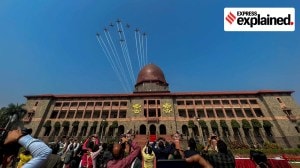Power Point Presentation
For Narendra Modi, Gujarat8217;s thriving development indices have been a handy plank to brandish...

For Narendra Modi, Gujarat8217;s thriving development indices have been a handy plank to brandish during elections. He has the plank firmly in place this time as well, pegging the BJP8217;s Jeetega Gujarat campaign on it and leading with the much talked about Jyotigram scheme8212;hoping it will power him to victory yet again.
Launched in September 2003, the Jyotigram electrification plan covers 18,065 villages, providing 24-hour, three-phase power to rural homes across Gujarat. The successful implementation even caught the fancy of former President A.P.J. Abdul Kalam, whose presence at the dedication ceremony gave Modi a good photo-op.
At the crux of the scheme has been the transfer of power supply to the agriculture sector from peak to off-peak hours. The work involved erecting 23.84 lakh poles, laying over 75,000 km of new power lines and setting up of 18,203 specially designed transformers. As many as 1,543 dedicated feeders were installed, separating various categories of users for smoother power supply to rural areas. This, even as the Gujarat Electricity Board was unspooled into seven companies8212;one each for generation and transmission, and four for distribution. The reforms have also provided the umbrella utility body, the Gujarat Urja Vikas Nigam Limited GUVNL, with surplus revenue.
Understandably, state Energy Minister Saurabh Patel, under whose stewardship the project was implemented, is gung-ho. 8220;Gujarat is the only state in the country to provide 24-hour power to its rural citizens. It will translate into solid support for us in the elections,8221; he says.
A smug BJP is highlighting the results of the scheme to buttress Patel8217;s claims. The 24-hour power has worked wonders for small enterprises like flour mills and food processing units, helping them churn more money in mainland Gujarat. A hurriedly conducted study by the Institute of Rural Management, Anand, IRMA, in 2005, even found that Jyotigram had helped reverse the rural-urban migration by as much as 33 per cent.
However, the picture is not as rosy as it seems. Patel and Modi have to contend with the farmers8217; discontent over the eight-hour, single-phase power being supplied to the fields, compared with the earlier 14-hour supply. The farmers believe that the 14-hour supply, despite breaks, was a better arrangement, and their angst has been conveniently lapped up by the Congress to turn it into an electoral issue. The Opposition party8217;s candidates are harping on the farmers8217; difficulties, creating a feeling of unease in the BJP.
To add to the BJP8217;s woes, the Sangh affiliate, Bharatiya Kisan Sangh BKS, is running a strident campaign to reveal the loopholes in the Modi Government8217;s claims. 8220;All Jyotigram feeders report more theft than normal feeders. Farmers are not getting enough power to draw the required water. What progress are they talking about?8221; says Kanu Patel of the BKS. Perhaps, the poll results will answer that.
- 01
- 02
- 03
- 04
- 05































